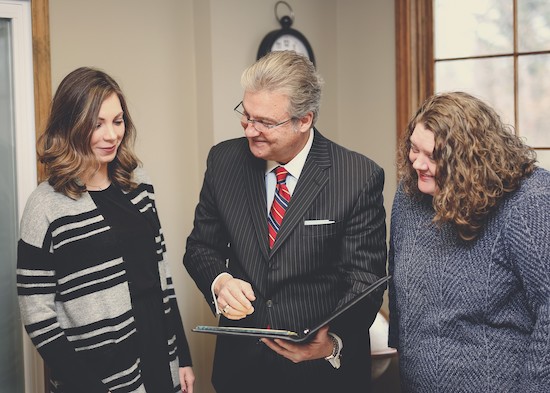Estate Planning Attorney in Novi
Our estate planning attorneys in Novi, Michigan have over 40 years of experience in creating estate plans. We have successfully assisted hundreds of clients with estate plans. Now may be the time to contact our Michigan Estate Planning attorney if you’re looking to update your estate plan, will or trust.
If you have questions about estate planning or an existing will or trust, contact our Novi office. Unlike some law firms, we pride ourselves on personalized service and estate planning solutions. And we’ll make sure you fully understand your options.
Call us today at (248) 650-0055 to find out how our Novi lawyers can help you.

At Sumner & Associates, P.C., our estate and wills attorneys handle a wide variety of issues, including:
- Comprehensive estate planning,
- Drafting wills and trust documents,
- Estate and trust administration,
- Guardianships and conservatorships,
- Powers of Attorney,
- Probate proceedings, and
- Special needs planning (if you or a loved one have serious disabilities).
Contact Us
Shared Contact Form
Used on Homepage and Local Pages
EXCELLENTTrustindex verifies that the original source of the review is Google. The estate planning process was very easy from beginning to end. Sarah and Bernard’s process was very efficient and we appreciated how easy this was. Would highly recommend using Sumner and Associates.Trustindex verifies that the original source of the review is Google. I am incredibly grateful to Scott and his team for their outstanding support during my divorce case. From the very beginning, they were professional, attentive, and empathetic, ensuring that I felt heard and understood throughout the process. Scott demonstrated remarkable expertise and flexibility, especially in handling complex matters like serving summons to my wife in India, making the process smoother than I anticipated. The communication was seamless, and I always felt informed and confident in their guidance. Thanks to Scott’s strategic approach, the case was resolved successfully. I highly recommend Scott and his team to anyone in need of dedicated, knowledgeable, and adaptable legal representation!Trustindex verifies that the original source of the review is Google. Great service. I would highly recommend Summer & Associates.Trustindex verifies that the original source of the review is Google. We recently had Sumner & Associates help us navigate our estate planning, and we couldn’t be happier. From the initial phone call from Scott, to the final review and signing of all of our documents with Bernard, they explained every detail, with patience, to us. We truly appreciated their thoroughness, personal attention and time they spent with us. The thought of estate planning was very daunting for us but with Sumner & Associates, they made it very easy, and now we are confident that we have everything in place. We highly recommend Sumner & Associates to anyone in need of estate planning services.Trustindex verifies that the original source of the review is Google. We recently worked with Scott and his team for estate planning. Scott and his team were extremely organized and professional throughout. He took careful time to ensure that we understood all of the implications and details, feeding us information via several session to ensure our desires were understood. His team was very quick to respond and worked with us to ensure that all of our questions, concerns, and special requests were considered. We would highly recommend Scott and his team for any estate planning!Trustindex verifies that the original source of the review is Google. I used Sumner and Associates for my Estate Plan. They did an excellent jog. Answered all of my questions thoroughly and did a great job of explaining the documents they provided. Most of it could be done by phone, which was great. Highly recommend themTrustindex verifies that the original source of the review is Google. We recently worked with Scott J. Sumner for our family’s estate planning, and the experience was exceptional from start to finish. We had a MetLife legal plan through our employer, and found them through that. Scott and his team made what can be a daunting process incredibly easy to understand. They were highly organized, walking us through each step with clarity and professionalism. We felt confident and well-supported throughout, knowing that no detail was overlooked. If you’re looking for an estate planning attorney who truly cares and simplifies the entire process, I highly recommend Scott and his team!Trustindex verifies that the original source of the review is Google. Great attention to detail! Scott took his time to explain any questions I had and label pages I need to use at the bank, etc. Sarah is also a joy to work with taking all my information and getting the job going. I highly recommend Sumner and Associates!Trustindex verifies that the original source of the review is Google. Sumner and Associates was wonderful to work with. We were building/updating our wills/trust, working from 2 states. The team was patient with our setup, very informational on combining our existing (and non-existing) paperwork, and made sure we left with everything needed and more for anything that may arise.
Frequently Asked Questions for Estate Planning Attorney Novi
- How long does it take to establish a living trust estate plan?
- What can I expect what I start the estate planning process with an attorney?
- How to fund your living trust?
- What type of assets would typically be used to fund the trust?
- How do I coordinate beneficiaries on my retirement accounts and life insurance with my trust?

How long does it take to establish a living trust estate plan?
A typical process from the talking with an attorney in the original planning meeting to finalizing your living trust estate plan should take 4-6 weeks, or less. The living trust is not established until it is properly signed by the person making the trust.What can I expect when I start the estate planning process with an attorney?
A planning process in an efficient and well-run estate planning practice should consist of a pre-meeting intake form to detail your specific information such as your names, address, contact information, family, and asset information. Next, is a meeting with an estate planning attorney to discuss, provide advice and establishing an outline for client’s estate plan documents. The attorney you meet with on phone, zoom or in person will ask all the necessary questions and gather all the right information needed to prepare an outline of your estate plan. This outline includes the names of people or institutions you will name as your fiduciaries and beneficiaries. Post meeting follow up with office will include– signing a written retainer agreement that spells out exactly what will be provided and at what fees. Then you will need to update your assets list if you have not provided the details in your intake. The hardest part of client homework is finding and providing a copy of the house deed. Your attorney will need the deed to your house, to gather accurate information to prepare another deed, to point your house into your Living trust. Document review at time of signing– Depending your retainer arrangement, you may be provided the opportunity to review documents prior to the execution. However, most document reviews take place the time the document are signed in the attorney’s office. This maintains efficiency and certainty of clients understanding and intent, at time of signing. Execution of your Estate Planning Documents in our office and how that looks– When the time comes to sign all the estate planning documents prepared for you, there will be an “execution ceremony” scheduled. Don’t worry, no one will get shot, but your documents will be legally executed before proper witness and notary laws. Your attorney will sit with you and go through each document as they are signed and explain “what is happening” and “who is involved” in each document, as you sign. After all the documents are properly executed and client questions are answered, we move onto the Funding & Beneficiary Coordination meeting. During this time our attorney sits with the client and reviews and discusses that proper ways to fund the living trust and how to coordinate the beneficiary designation of retirement accounts and life insurance beneficiaries. Our office even provides a custom information sheet for client’s future use in identifying how to title assets and name beneficiaries on accounts, in the future.How to fund your living trust?
Once a Revocable Living Trust has been established, it needs to be funded. Funding means that assets need to be retitled into the name of the trust. I suggest this metaphor to my clients: Think of your trust as a big box I got from CostCo and set it upon the conference room table. Then, you get out a Sharpie marker and write on the side of the box, who will manage the assets in the box upon your death and who the beneficiaries will be. Once you write the names on the side of the box, you sign your name to it. Now, when you pass, this box gets pushed across the table to your successors to distribute your assets, but they find nothing in the box. The reason there is nothing in the box, is because you died with all your assets in your name. You did not transfer assets from your name into the box. Your Revocable Living Trust needs to be funded with assets during your lifetime, so these assets will not be in your name when you pass. By retitling assets during your lifetime, into your living trust, these assets will be able to avoid the delays and cost of Probate Court. If assets are retitled into the trust before the trust maker passes, these assets will avoid probate. However, if the trust maker fails to transfer assets into the trust during his/her lifetime, then those assets may be subject to the probate process.What type of assets would typically be used to fund the trust?
Typically, your living trust would be funded with certain classes of assets that are not “deferred assets”. For example, retirement accounts are deferred tax assets and are not used to fund a trust. Life insurance death benefits are deferred and not attainable during a person’s lifetime. Assets that would be funded into a Revocable Living Trust, immediately upon being established are:- Real Estate.
- Bank Accounts, Credit Union Accounts, Certificates of Deposit, Money Market Accounts.
- Investment & Brokerage Accounts (non-retirement stocks, mutual funds, bond funds.)
- Retirement accounts- 401k, 403b, IRA’s, ROTH IRA and all deferred retirement accounts.
- Annuities and Pensions.
- Life Insurance.
- (Although it is not a deferred asset, vehicles do not go into the trust. This is for liability purposes.)
